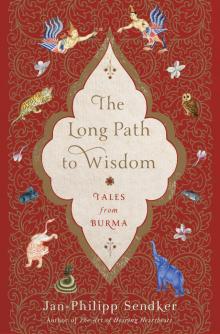- Home
- Jan-Philipp Sendker
The Far Side of the Night Page 2
The Far Side of the Night Read online
Page 2
One week later, Paul took Zhang to the airport. He wanted to say goodbye and to help with his luggage. But Zhang was travelling with only a bright yellow imitation leather case that was so small he never needed any help with it. He had arrived in Shenzhen thirty years ago with nothing, and wanted to leave the city with nothing.
Since that farewell, they had not seen each other, only talked on the phone now and then and sent the odd email. Paul had been determined to visit Zhang, but something had always got in the way.
_________
Now he watched Zhang and saw his friend the way he remembered him. The way he bent over the tomatoes with a skeptical eye and examined the pak choi carefully, picking up a dozen aubergines before finding the right one. The way he sniffed at garlic and Sichuan peppers or asked the market stallholder about the quality of the fresh tofu. Even as a monk, he had clearly not lost his passion for cooking.
Paul had missed Zhang very much in the last few years. But it had been easy to put thoughts of his friend aside in Hong Kong. He realized that it would be very difficult to say goodbye again in a few days.
The monastery was surrounded by a red wall, several meters high, and was hidden in a development of new housing, between tower blocks that were forty stories high. Zhang led them into the courtyard. Red lanterns hung from the roofs of the three temples in the middle, one behind the other. Plumes of incense smoke rose from the temples into the evening sky.
They walked past piles of building rubble, pallets of new roofing tiles and bricks, wooden beams and scaffolding. A rat scuttled across the courtyard.
David clung tightly to his father, burying his face between Paul’s shoulder and neck. He raised his head only once and looked around.
“I’m hungry,” he whispered.
The kitchen was basic, with a long table, a couple of stools, a work surface, stove, and sink. Pots, pans, and crockery were on a dresser. A fire was burning in the oven.
Zhang put the groceries down.
“How about some vegetarian ma po tofu, lotus roots in sweet and sour sauce, stir-fried vegetables, and then dan dan noodles to finish? I’ll fry some spring onion pancakes for your son.”
“Don’t go to all that trouble. Rice and some vegetables will be enough.”
Zhang gave him a disappointed look. “What’s wrong with you? You want to celebrate our seeing each other again with just rice and vegetables?”
“No. I just don’t want you to have all that bother.”
“I’m not doing it on my own. We’re cooking together.”
Zhang fetched knives, chopping boards, and bowls from the dresser and put them on the table in front of them.
Paul was too surprised to say anything in response. He had never been allowed to help his friend cook before.
In the past, Zhang had barely spoken while cooking. If Paul had said anything he had not even heard him, so absorbed had he been in a world of aromas and spices, of herbs, oils, and pastes. Paul had long thought that cooking was just another form of meditation for Zhang, until he had told him the story of Old Hu. During the Cultural Revolution, Zhang had witnessed Red Guards beating the old man to death because he had dared to add some pepper to the soup from the commune’s kitchen. That had been sufficient proof of his ‘decadent, bourgeois’ attitude.
The soup had to taste the same for everyone.
Ever since this experience, Zhang said, every meal cooked with care and effort was a celebration to him. A small, quiet triumph of life over death. Of love over hatred. And the better the food tasted, the more the taste buds were tickled, the nose stimulated, and the belly filled, the sweeter the victory. He could not prepare a single meal without thinking about Old Hu.
_________
He put a bowl of water on the table and laid lotus roots, tomatoes, aubergines, courgettes, spring onions, red peppers, cucumbers and carrots down next to it.
“Hey, little one, you can wash the vegetables if you like,” he said, turning to David.
To Paul’s astonishment, his son knelt on his stool and set to work. He conscientiously dipped each vegetable in water, rubbed it, and showed each piece to Zhang, who nodded in approval.
Paul picked up the washed vegetables and cut them into thin slices. Zhang peeled garlic and onions, made the pancake batter and started busying himself at the stove.
The smell of garlic and spring onions frying and of sesame oil and ginger soon filled the kitchen.
Zhang fetched a can of Sichuan peppers from a drawer and sniffed it.
“Do you know what this used to be called?”
Paul shook his head.
“Barbarian pepper.”
“Because it’s so spicy?”
“No. Because it came from America to China.”
Zhang smiled, and for a moment Paul thought he was joking.
“The world is filled with barbarians – apart from us Chinese, of course.”
Half an hour later, dinner was on the table. Zhang had not forgotten how to cook even though he was now a monk. The lotus roots were neither too firm nor too soft. Paul knew from experience how difficult that was to achieve. The mapo tofu was delicious even without meat. Zhang had got the spiciness perfectly right – the Sichuan pepper spread its subtly numbing effect on the tongue and taste buds without the chili burning the throat.
Even David enjoyed it. He ate a second pancake, crept into his father’s arms and, exhausted, fell asleep in minutes.
“Shall we put him in my bed?” Zhang asked.
Paul nodded.
_________
Zhang’s room was on the other side of the courtyard. It had space for a bed, a chair and small closet. A bare bulb dangled from the ceiling. Paul laid his son on the bed, covered him with a blanket and switched off the light. Zhang and Paul sat down on two stools by the door. An elderly monk shuffled across the courtyard. His back was so bent that it was an effort for him to look straight ahead. He did not notice them.
III
“What’s wrong?” he heard his friend say.
“What do you mean?”
Zhang turned his head and looked at him thoughtfully.
“I’ve missed you,” Paul said, a little embarrassed.
Zhang did not reply. He turned his gaze away and looked once more into the courtyard, which was lit only by a couple of lanterns.
After a long pause Paul said, “Everything’s fine.”
“I’m glad to hear that.”
He heard David cough in his sleep inside the room.
“And how are things with you?”
“All fine too.”
Perhaps he had underestimated the differences between the paths they had taken in the last three years, Paul thought.
The monk and the father (once more).
They were both searching.
But each of them in a different way.
There was so much to say but they didn’t have much time. Where to begin? How to separate the essential from the inessential under such pressure?
The more oppressive he found the silence, the greater the tension within him. Until it unloaded itself in a torrent of speech. Until his longing to share his feelings with his friend was greater than his fear of talking about things that he would rather have kept silent about.
He tore through the last few years without stopping.
The birth of David and the hopes he had built around that.
Christine moving in. She had given up her flat in Hang Hau and had, along with Josh, her son from her first marriage, and her mother, moved in with him. That was a challenge; they both knew that. Although her mother had moved into a small flat in Yung Shue Wan after a few months, she was a permanent guest.
His efforts to share with them a house and life that had, until then, been occupied only by him and his dead son. His efforts to fit in, to meet the demands of living in a group of five people.
The way a family was meant to be only showed him what he did not have, or had only very little of: the ability to live in a
community. To adapt. To tolerate closeness.
And how could he have learned that? He had not had any examples to follow. The day he left his parents’ house, when he was eighteen, had been the best day of his childhood and youth.
Family life. Eating together. Looking at each other. Conversations in which hints were often sufficient to communicate with the other. Or to hurt them. Wordless understanding, or the lack of it.
Sometimes he sat there, listened, watched, and felt like an impostor. Like someone acting the role of a family member.
He was a stranger in his own home.
Christine did not understand it.
A stranger in his own life.
She would probably understand that even less.
How lonely a person could be under a shared roof. And it was his fault. His failure – he knew that. And it did not make things any easier.
What was even worse was how torn he felt with regard to Justin and David.
After David’s birth he had done everything he had intended to do. Repainted Justin’s room. Replaced the gentle pale blue with a rich yellow. Put away the stuffed toys in a box that was now under their bed. On his side. Taken most of the drawings and photos off the walls. Put away Justin’s wellies and raincoat that had been in the hallway.
He had not been able to bring himself to paint over the doorframe with the markings for Justin’s growing body.
28 February – 128 centimeters. The final entry.
But after he had thought about it some more, he had allowed Josh to paint the doorframe for him. David’s growth must not be measured against that of his deceased half-brother.
And yet.
David’s birth had not made his memories fade away. They had animated them instead. The first time he crawled. The first steps. The first words. How could he not think of Justin each time? And of course those memories were cast in a deep black shadow that mixed every feeling of joy with so much pain that he could no longer tell the two feelings apart.
Pain, joy, joy, pain.
He had sworn not to compare them. But he did it anyway.
What had Christine expected? That he would erase his dead son from his memories? (Of course not, she said.) Forgetting was like dying. (That’s not what this is about, Paul!).
They fought often about that too.
Nevertheless, the love had not diminished. Not his, at least. Perhaps even the opposite had happened. But he was not so sure about Christine sometimes.
Zhang listened. Cast him sideways glances from time to time. The Zhang expression. An attentive, open face, with deep lines and more than a hint of melancholy in the eyes.
“Difficult,” Zhang said quietly after a long pause. “Very difficult.”
That was sufficient comfort.
The situation he was in was exactly that: difficult. Very difficult. No one could help him with it. He would have to find a path through it. Possibly a new one every day.
Paul heard his son cough violently so he got up and went to check on him. When he returned, Zhang was leaning against a pillar, looking at the night sky and smoking.
“I thought you’d given up?”
“I have,” Zhang responded laconically. A thin smile.
Maybe, Paul thought, he would find life on Lamma easier if there were more evenings like this one. He swore to himself to visit his friend more often in future.
“What on earth was happening in the square this afternoon?”
“Shi has a new Party chairman, Chen Jian Guo. Have you not heard of him?”
Paul thought for a moment. The name seemed familiar. “Chen Jian Guo? That sounds like the name of one of the heroes who fought alongside Mao on the Long March.”
“That’s right,” Zhang said. “Chen is his son. A rising star in the Communist Party. He must be a fervent fan of the Cultural Revolution.”
“Didn’t his father go to jail?” Paul asked.
“Yes. So did he. The whole family did. His mother committed suicide because of it. And yet he’s reintroduced the singing of those revolutionary songs in public.”
“Have all the placards and propaganda posters by the roadside got anything to do with that?”
“Yes. Every few weeks there is a new political campaign against some evil or other. And people love it. Hadn’t you heard of him before?”
“Yes, now I remember. But I don’t know much about him.”
Zhang nodded. “Remember his name. He has lots of charisma and he is very ambitious. Many people think he will one day be the most powerful man in China. He has Shi completely in his grip, and is governing the city like a red emperor. There are often show trials and a couple of executions. He threatens the rich and criticizes corrupt Party cadres and fat cats even though he is one himself. But it’s going down well with the people. He’s very popular.”
Suddenly they heard a voice in the darkness.
“Master Zhang?”
They turned around in surprise. A man was standing in front of them. He lowered his gaze and bowed.
“Xi, what are you doing here at this hour?”
“Please excuse me for disturbing you, but may I speak to you for a moment, Master Zhang? It’s urgent.”
IV
Zhang winced every time one of his students addressed him as ‘Master’. Even the sound of the word was unpleasant to him.
One year after his arrival, Zhang had, against the abbot’s will, started inviting visitors to the monastery for evening discussions on the teachings of Buddha. A small but loyal group had grown out of this; they met every week, and regarded Zhang as their teacher. They admired his decision to reject the temptations of the world and enter a monastery. They regarded him as a wise man because he had acted on his beliefs. Some of them revered him as a guru because he had no interest in material things.
Zhang was flattered by their admiration, but he knew that they had the wrong man.
He was no master. By no means.
He was weak. He was small, frightened, and vulnerable to temptation.
He was searching.
Like they all were.
Xi must really need help to visit him so late at night. Zhang made his excuses to Paul, took Xi aside and walked a few steps across the courtyard with him.
“What can I do for you?”
“I got a call from a friend in the Party,” Xi whispered. His voice trembled, betraying his anxiety. His brow was finely beaded with sweat. “I’m going to be arrested in the next few days.”
Zhang took a deep breath and gazed steadily at him. Xi was one of his most eager students, hungry for knowledge. Recently, he had made generous donations to the monastery more frequently. The monks had drily called these donations ‘soul salvation money’.
As far as Zhang knew, Xi had made his fortune with the construction of flats and retirement homes. He had a young wife, a son, and two mistresses and, in the last few months, mounting worries. He owed his riches to corrupt officials in the city administration who were now falling victim to Chen’s anti-corruption purges one by one. The new cadres were no less greedy, but they belonged to another faction in the Party, and did their deals with their own people.
Zhang was not sure what Xi wanted from him. He must have known this could happen. “Are you surprised?”
“No.”
“Do you think it’s unfair?”
“Yes . . . No . . . Yes.”
“Are there grounds to arrest you?”
“Yes.”
“Aren’t we all responsible for the consequences of our actions?”
“Yes.”
“Why is this unfair, then?”
“Because . . . because I only did what everyone else was doing.”
Zhang sighed briefly. He did not want to engage in a longer discussion about Buddha’s teachings now. “How can I help you?”
Xi hesitated before replying. He looked down at the ground and spoke in an even quieter voice. “I could escape to America tomorrow via Hong Kong. I have a visa.”
“And?”
“I would have to leave everything. My son, and my wife too. I don’t know what I should do.”
“And you think I can tell you that?”
Xi nodded. “Yes.”
Zhang shook his head gently. “You’re wrong about that.”
“Master Zhang, I trust you. You know what I should do.”
“No.” Zhang felt more and more uncomfortable. He did not like Xi’s tone of voice and his body language; it was meant as an expression of respect, but he found it submissive and obsequious.
“Please, Master Zhang. Give me some advice at least.”
“Who am I to give you advice? The answer is within you.”
“No,” Xi said vehemently. “No. Or I wouldn’t be here.”
“No one can take the decision for you.”
“I know. But I’m so confused. I need your help, Master Zhang. You must tell me what I should do. Can I leave my family on their own?”
Zhang tried not to let his increasing annoyance show. “I can’t tell you that. No one can, apart from you yourself.”
He saw the disappointment in Xi’s face. And the despair too.
But he felt no pity. “I can’t help you with this,” he said shortly. “Is there anything else?”
His student wanted to say something but then he thought better of it and stayed silent.
“Then you’ll have to excuse me. I have a friend visiting from Hong Kong.”
Xi swallowed, bit his lip, hesitated for a moment, then turned his back silently and slowly disappeared into the darkness. Zhang looked at him as he walked away and wondered for a moment if he should call him back, but that would have been dishonest. He had meant every word he said. There was nothing else to add.
_________
Zhang went back to Paul and told him about the brief conversation with Xi.
“I never knew that you could be so . . .” Paul paused, searching for the right word. “So abrasive.”
Zhang lit himself another cigarette, deep in thought. “Neither did I.”
“I thought monks learned the art of serenity in a Buddhist monastery,” Paul said teasingly.

 The Language of Solitude
The Language of Solitude A Well-Tempered Heart
A Well-Tempered Heart The Art of Hearing Heartbeats
The Art of Hearing Heartbeats The Far Side of the Night
The Far Side of the Night Whispering Shadows
Whispering Shadows Dragon Games
Dragon Games The Long Path to Wisdom
The Long Path to Wisdom